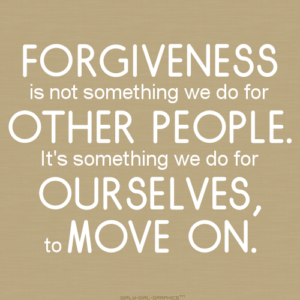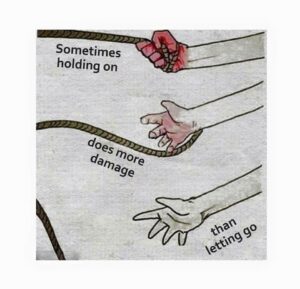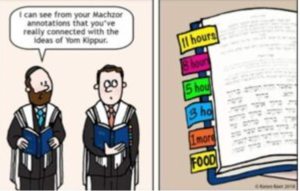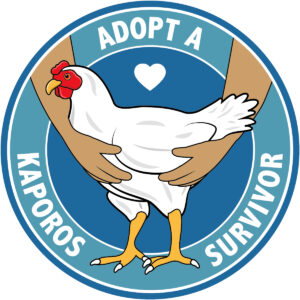Pre Yom Kippur 2023: Reconciliation Without Forgiveness & The Annual Form of Forgiveness
by devadmin | September 24, 2023 2:35 am
Reconciliation Without Forgiveness & the Annual Pre- Yom Kippur Form of Forgiveness:
Raboyseyee and Ladies:
Back in Parshas Vayichi, the heylige Ois posted this gevaldige piece which led a few to reconcile with friends and relatives they had not spoken to for extended periods of time. I posed the following question: Is this concept of reconciliation without forgiveness at all feasible? We’ve all heard and read much about forgiveness without reconciliation, ober farkert? Can a broken relationships be repaired? Can we resume a relationship without ever having reconciled? Must we forgive before Yom Kippur? Everyone? No matter how egregious the behavior was?
Let’s get real: we all have people in our lives that we are angry with, we no longer speak to them. These people have pissed us off and we’re done. We stop talking to them and shoin. The relationship -efsher years old and decades in the making- is over and out, dead and kaput. They no longer occupy space in our minds.
At times, we remain mad as hell, even years later. In other instances, we no longer remember with clarity why we stopped talking to them but the cold war continues. It’s now a tradition. It’s how real life is and how it’s been since Toirah times. By people, we include relatives (siblings, uncles, aunts, cousins), former partners, and very close friends, that pissed us off and angered us mamish. Many have at least one from each category; oy vey! At times, the situation taka calls for a clean break mamish; we no longer talk to that person. Then there are times where we continue talking -mostly small talk- and make believe all is good; the facts on the ground tell a different story. We’re still quite angry but circumstances dictate that we -at least outwardly- continue the now deeply wounded relationship. These are but two examples, there are many others between the clean break and moving on. Ober, can relationships be full restored? And we begin with this topic why? Davka because it’s relevant in the parsha and even more so in our daily lives; seemingly always. More on this topic below but let us begin here.
In Parshas Vayichi – a few months back- we said goodbye to Sefer Bereishis. We were 1/5 of the way through yet another cycle. And here we are about conclude yet another cycle of the heylige Toirah. Back then, we said good-bye to the entire Yaakov Ovenu mishpocho (family) including Yoisef, our favorite Toirah character, and his brothers. He died at the age of 110. In the last parsha of the heylige Toirah, we will say goodbye to Moishe. Back in Vayichi, we only bid farewell to Yaakov and Yoisef; the death of the individual brothers is not recorded in the Toirah but one week later, the heylige Toirah informed us that they and the entire generation of people were long dead. Then again, one parsha later and another 210 years had passed. Yaakov’s passing and burial, though recorded in great and colorful detail, and witnessed by his family and many Egyptian officers, might not have happened. It didn’t? How could that be? Says at least one medrish and the heylige Gemora (Taanis 5b) that Yaakov never died! Is he alive or dead? Ver veyst. We have previously covered this topic. Want more information? Go to archives at www.Oisvorfer.com.
No one seems to argue about Yoisef’s passing; he taka died and was embalmed. Another medrish told us that Eisav, whose passing is not recorded in our parsha or any other, and from whom we have not heard since his father’s levaya a number of weeks back, will also die this week. The medrish will also tell us that just prior to death he did teshuva (repented) and his head, neatly chopped off by Chushim one of Yaakov’s eyniklich (grandchildren) rolled into and is buried in the Meoras Hamachpela alongside our other forefathers and foremothers. Avrohom got real value for the shekels he paid. The good news: seemingly, repentance can still be achieved in the last seconds of life and that is of course good news, maybe givaldig for most of us. Sounds plausible. When are those last seconds? Ver veyst?
As mentioned, by the time we began Sefer Shmois, Yaakov’s entire family and generation were all gone. The Yiddin were enslaved to Paroy, minuvil that he was, and we read of their great suffering, the four expressions of redemption which incidentally was a boon to the wine business and the entire Pesach industry.
Shoin, speaking of Eisav’s last-minute teshuva, let’s open -and maybe also close- with this topic. It’s in Parshas Vayichi -way towards the end- and only after Yaakov dies and is buried, that the brothers talked amongst themselves and decided that they didn’t have proper closure with their brother Yoisef. It’s emes that they have been civil since Yoisef’s great reveal one parsha earlier. They had been talking. Rashi tells us that Yoisef used to have them over for meals while Yaakov was still alive; isn’t that a barometer for friendship -even in our times? It is! Yoisef fed the family during the famine and zicher protected them over in Goishen. Perhaps he had them over for a kiddish. Many years had passed, 17 to be exact. And they finally figured out that with their father now gone, perhaps Yoisef might seek to exact revenge. You think? Who can blame Yosef if he did? And who would blame them for finally verbalizing the issue? Did they ever properly apologize and admit their wrongdoing? Did they do teshuva?
Let’s recall that in Vayigash -post revelation- all they did was withdraw, take a step back. Why? They were exposed, shocked and embarrassed. Rashi told us that Yoisef too was exposed -for a brief moment- but that for another time. Yoisef spoke and tried to comfort them. And it’s true that after he kissed them and cried, they were finally able to speak back to him. Rashi confirms that Yoisef and the brothers even broke bread together but that the invites stopped following the passing of Yaakov.

Ober, it’s seemingly also true that there was no proper closure to the entire traumatic event. Nowhere in the text, do we find that the holy brothers took responsibility for their actions, that they owned their great sin(s). Zicher you all recall what they did to their younger brother and the pain and anguish they caused their father. Life just went on. Thankfully, as Vayichi comes to a close, we will finally read some interesting text where the brothers – selfishly motivated perhaps by self-preservation- make the big move and say the right words. We have sinned, we are wrong, please forgive us. But did they actually say these words? Let’s read posik 17.
| So shall you say to Joseph, “Please, forgive now your brothers’ transgression and their sin, for they did evil to you. Now please forgive the transgression of the servants of the G-d of your father.” ‘ ” Joseph wept when they spoke to him. | יז.כֹּה תֹאמְרוּ לְיוֹסֵף אָנָּא שָׂא נָא פֶּשַׁע אַחֶיךָ וְחַטָּאתָם כִּי רָעָה גְמָלוּךָ וְעַתָּה שָׂא נָא לְפֶשַׁע עַבְדֵי אֱלֹהֵי אָבִיךָ וַיֵּבְךְּ יוֹסֵף בְּדַבְּרָם אֵלָיו: |
Ober, did the holy brothers mamish state these words of apology to Yoisef’s face? Let’s read the beginning of that posik one more time. “So shall you say…” Who is the “you” in the sentence? It appears from the text of the heylige Toirah that they sent a messenger and instructed him -or it- to convey these words. And the question is azoy: did they themselves properly apologize? Is apologizing through a messenger acceptable? The good news: it does appear that Yoisef listened to the words of the messenger and forgave. Did he? And did they actually apologize? Or, was this their last scam? Was it at all emes that their father left instructions for Yoisef to forgive them? Let’s say this: if Yaakov left such instructions, they are not recorded anywhere. Grada, many family (and other) disputes run on for years because no one is ready to properly apologize. Why they didn’t utter these 16 words 17 years back, ver veyst? The good news: seemingly, it wasn’t too late.

A shaylo we can ask is this: Are there actions that remain unforgivable? Can a brother, relative, or friend, hurt you to the point of no return? Is it forever? Did the crime the brothers perpetrated rise to that level? Or, does every sincere, genuine, remorseful apology and appeal for forgiveness deserve to be granted? Was an apology via a messenger valid? Were the brothers sincere? Or, were they just worried about Yoisef’s revenge now that their father passed away? Shoin, lets us first examine the historical facts as the RBSO gave them to us in the heylige Toirah.
וַיִּרְא֤וּ אֲחֵֽי־יוֹסֵף֙ כִּי־מֵ֣ת אֲבִיהֶ֔ם וַיֹּ֣אמְר֔וּ ל֥וּ יִשְׂטְמֵ֖נוּ יוֹסֵ֑ף וְהָשֵׁ֤ב יָשִׁיב֙ לָ֔נוּ אֵ֚ת כׇּל־הָ֣רָעָ֔ה אֲשֶׁ֥ר גָּמַ֖לְנוּ אֹתֽוֹ׃
When Joseph’s brothers saw that their father was dead, they said, “What if Joseph still bears a grudge against us and pays us back for all the wrong that we did him!”
וַיְצַוּ֕וּ אֶל־יוֹסֵ֖ף לֵאמֹ֑ר אָבִ֣יךָ צִוָּ֔ה לִפְנֵ֥י מוֹת֖וֹ לֵאמֹֽר׃
So they sent this message to Joseph, “Before his death your father left this instruction:
כֹּֽה־תֹאמְר֣וּ לְיוֹסֵ֗ף אָ֣נָּ֡א שָׂ֣א נָ֠א פֶּ֣שַׁע אַחֶ֤יךָ וְחַטָּאתָם֙ כִּי־רָעָ֣ה גְמָל֔וּךָ וְעַתָּה֙ שָׂ֣א נָ֔א לְפֶ֥שַׁע עַבְדֵ֖י אֱלֹהֵ֣י אָבִ֑יךָ וַיֵּ֥בְךְּ יוֹסֵ֖ף בְּדַבְּרָ֥ם אֵלָֽיו׃
So shall you say to Joseph, ‘Forgive, I urge you, the offense and guilt of your brothers who treated you so harshly.’ Therefore, please forgive the offense of the servants of the G-d of your father’s [house].” And Joseph was in tears as they spoke to him.
וַיֵּלְכוּ֙ גַּם־אֶחָ֔יו וַֽיִּפְּל֖וּ לְפָנָ֑יו וַיֹּ֣אמְר֔וּ הִנֶּ֥נּֽוּ לְךָ֖ לַעֲבָדִֽים׃
His brothers went to him themselves, flung themselves before him, and said, “We are prepared to be your slaves.”
וַיֹּ֧אמֶר אֲלֵהֶ֛ם יוֹסֵ֖ף אַל־תִּירָ֑אוּ כִּ֛י הֲתַ֥חַת אֱלֹהִ֖ים אָֽנִי׃
But Joseph said to them, “Have no fear! Am I a substitute for G-d?
וְאַתֶּ֕ם חֲשַׁבְתֶּ֥ם עָלַ֖י רָעָ֑ה אֱלֹהִים֙ חֲשָׁבָ֣הּ לְטֹבָ֔ה לְמַ֗עַן עֲשֹׂ֛ה כַּיּ֥וֹם הַזֶּ֖ה לְהַחֲיֹ֥ת עַם־רָֽב׃
Besides, although you intended me harm, G-d intended it for good, so as to bring about the present result—the survival of many people.
וְעַתָּה֙ אַל־תִּירָ֔אוּ אָנֹכִ֛י אֲכַלְכֵּ֥ל אֶתְכֶ֖ם וְאֶֽת־טַפְּכֶ֑ם וַיְנַחֵ֣ם אוֹתָ֔ם וַיְדַבֵּ֖ר עַל־לִבָּֽם׃
And so, fear not. I will sustain you and your children (little ones). Thus he reassured them, speaking kindly to them.
Ok, what do we know? A few things. We know that Yaakov gave no such instructions; seemingly, the boys made that part up. From the exchange in the pisukim we also know that Yoisef’s brothers did not feel pardoned or forgiven when he first told them -in last week’s parsha- that the RBSO arranged everything, including their crime. They may have had meals together but they weren’t feeling very secure. Though they heard Yoisef lay all blame for what took place at the RBSO’s Hands, they were still frightened that he would exact revenge and then tell them it was all the doing of the RBSO. Tit for tat? And for those reasons -in our parsha- following Yaakov’s passing and burial -without his protection- they did not feel safe with Yoisef. Why should they? What to do? They haven’t properly apologized! Ober, Yoisef was the man! He implies again that only the RBSO can decide whether to punish them. Yoisef will provide sustenance he assures them but not to worry; the meals were not coming with just deserts.

Did the brothers ever mouth these words of apology directly to Yoisef? Seemingly not! They sent a messenger! Should forgiveness be granted through a messenger? It’s taka emes that last week Yoisef implied that only the RBSO can decide whether to punish the brothers. He repeats the same message; “…am I in place of the RBSO,” he asks? He gave them a pass by stating that only the RBSO was, and could be responsible for his brothers’ crimes. On the other hand, when the messenger -on their behalf- asks Yoisef to pardon them, does he? He does not. Instead, he says: “And now, don’t be afraid; I myself will provide for you and your little ones.” And he comforted them and he spoke upon their hearts. The bottom line: it does appear to the Ois that Yoisef comforted his brothers and persuaded them that he will continue to be responsible for their well-being. He did not however pardon them. He seemingly reconciled but did not offer forgiveness. Another bottom line: the road to reconciliation can -at times- be safely navigated even without forgiveness and or a pardon. How does all that work? The heylige Gemora offers some direction.
Says the heylige Gemora (Rosh Hashono 17a) azoy: “Kol ha’maavir al midosav, ma’avirin lo kol p’shaav. Let’s do that in loose English: “….. With regard to whoever forgoes his reckonings with others for injustices done to him, the heavenly court in turn forgoes punishment for all his sins, as it is stated (Micha 7:18): “He bears sin and forgives transgression” נוֹשֵׂא עָוֹן וְעוֹבֵר עַל פֶּשַׁע״. לְמִי נוֹשֵׂא עָוֹן — לְמִי שֶׁעוֹבֵר עַל פֶּשַׁע. Whose sins does He bear? The sins of one who forgoes his reckonings with others for injustices committed against him.” For these people, the RBSO will look aside at all their sins. Says Rashi, this refers to someone who is not meticulous about measuring the pain others caused him/her and refrains from measuring, and lets it go.
Says the Ois: that’s a damn good deal and we should all be taking it! With this statement from the heylige Gemora we chap the formula for receiving forgiveness from the Heavenly court. The RBSO seemingly approaches us with the same attitude and philosophy we approach the people in our lives. He judges us with a mirror. If we are exacting, accounting and unforgiving to those around us, He is exacting, accounting and unforgiving of us. That cannot be good news for most of us who carry broiges (anger) around for years; not at all! Ober, if we instead choose to dismiss, minimize and ignore the slights, snubs and slurs that people have perpetrated against us, then the RBSO chooses to dismiss and ignore our slights and snubs of Him. Mamish gishmak!
Let’s also read the heylige Gemora (Yoma 23a) where we learn more about this ‘get out of hell pass.’ The Gemora responds that the prohibition against taking vengeance and bearing a grudge indeed applies to cases of personal anguish; however, actually, the scholar may keep resentment in his heart, though he should not act on it or remind the other person of his insulting behavior. Let’s call it the scholar exemption. The heylige Gemora asks azoy: But didn’t Rovo say: With regard to whoever forgoes his reckonings with others for injustices done to him, the heavenly court in turn forgoes punishment for all his sins? Answers the Gemora so gishmak azoy: Indeed, even a scholar who is insulted must forgive insults, but that is only in cases where his antagonist has sought to appease him, in which case he should allow himself to be appeased toward him. However, if no apology has been offered, the scholar should not forgive him, in order to uphold the honor of the Torah.
As an aside, it so happens that just last shabbis the Ois was upset with a chaver, ober after reviewing the Gemoras on the subject matter, and knowing that he too -from time to time- angers a few, decided to wash it away. To forget the incident like it never happened. Ershtens, it wasn’t egregious enough for a fight. Secondly, perhaps the Ois can get some extra credit with the RBSO. The bottom line: letting go, walking away, is taka a very tall order. Rovo chapped that concept and therefore was bold enough to teach that the RBSO will forgive those who forgo. Sadly, not too many follow Rovo in real life.

Yoisef carries the appellation “hatzadik,” the righteous one. Many suggest he earned this title by rebuffing the advances of Mrs. Potiphar. Perhaps. Or, might we suggest he was deserving when he made peace with his brothers though they never apologized to this face? Yoisef was great davka because he moved on. He reconciled with his -at times at least- not so holy brothers though they never verbally apologized to his face. No flowers, text, WhatsApp, and no email; nothing. Most of us cannot attain this level of righteousness. We should however be more accepting if someone offers up an apology, explicitly or implicitly. We need to counter back with acceptance and forgiveness; close the matter and veyter gigangin (let’s move on). On the other hand, what to do in situations where a person wrongs you but will never admit nor apologize? Perhaps Yoisef provided the answer: while me may struggle to forgive them, Yoisef teaches us that we can reach a working relationship with them even if the relationship is not what it was. A full reconciliation requires that last step; without the apology, it’s incomplete. As an aside, this is an Ois original pshat. Gishmak!

Let’s close with chazak, chazak, vi’nischazake. Let us be strong, be strong, and let us be strengthened. Let us apologize and say we are sorry to those we either wronged and maybe even to those who think we wronged them. May we all be blessed with a greater ability to apologize, to forgive, to accept apologies when offered, and some form of reconciliation even without.

Yom Kippur 2023: MICHILA (FORGIVENESS) IN 10 EASY STEPS
As you well know, or should, after hearing it from every rebbe, rabbi and others, Yom Kippur does not forgive sins between man and man. Shoin, let’s not get bogged down with gender identity terminology but the bottom line is azoy: if you aggrieved your fellow man (or woman), anyone that identities as on or the other, or anyone else for that matter, you can’t just walk into shul, klap (beat) your chest while reciting a few dozen OSHAMNU’S (confessions) followed by hundreds of AL CHEYTS and be done with it. It’s not how the system works. As an aside, why we beat our chests when we should be knocking our heads -or other parts of our bodies, if you chap- for the stupid things we thought, said and did, ver veyst? Instead, we beat our chests?

Yikes, and let’s get real: the RBSO knows just who you are and why you behave as you do. After all, that’s how He made us. We are less than perfect and He is seemingly Ok with us as long as we try, and also apologize at least once a year by fasting, confessing our sins, and by reciting the long list of sins committed over and again. During davening, and in raised voices, we repeat over and again the RBSO’s 13 Attributes of Mercy. Is that it? Not!
Over the years, our sages added symbolic minhogim (customs) instituted to increase our chances of forgiveness. These include an increase in charitable giving. This of course symbolizes our attempt to buy our way out of the mess we created.

Others waive a live chicken over their heads hopeful of transferring their many sins onto the innocent unsuspecting chicken. Exactly how that works, ver veyst?! The bottom line: over the past 13 years we have written about each of these practices; those interested should click here https://www.oisvorfer.com and search for “Yom Kippur”.

Yom Kippur -so we were taught- does forgive sins you committed against the RBSO. There are many pisukim to quote as back up. Your slate, efsher clean as you left shul last Yom Kippur, is shmutzig (soiled), perhaps filthy, all over again. But lucky for you, the RBSO is about to give you another chance to get your act together. Says the heylige Toirah (Vayikro 16:30), azoy: “For on this day [Yom Kippur] He shall effect atonement for you to cleanse you. Before G‑d, you shall be cleansed from all your sins.” Is that it? What could be better?
Ober, let us not forget the massive amounts of hurtful things that came out of your mouth this past year. The number of people you gossiped about, slandered and worse. What could be worse? Not much! Oy vey! And -as mentioned, when it comes to sins you committed against your fellow man (or woman), our sages tell us that you must ask for and receive personal forgiveness. How far does one have to go to seek such forgiveness? Very! Our sages teach us that we should reach out to them and seek their personal forgiveness. In fact, we must make three attempts to appease the aggrieved party. Afterall, how can we expect the RBSO to forgive us if we’re not willing to give someone a second chance?
On the other hand, why apologize? The bottom line: We apologize because what the RBSO desires most is for His creations to exist in harmony. Says Rebbe Yehudah HaNossi azoy: so great is the pursuit of harmony that even if we prayed to idols, but were at peace with one another, the RBSO would ignore the idolatry worship “because there is peace between them.” Did he mamish say that? So says the medrish (Bereishis Rabbah 38:6).
And what to do if you’re the aggrieved party? What if you are mamish really angry with someone because that person really betrayed you? Secrets you shared with him were passed on? Monies he told you would be repaid were not? The list goes on. Must you forgive that person if he/she hasn’t apologized? Our sages teach as azoy: you -the person that aggrieved his friend- should present yourself near that person’s house in the hope that she/he will see you when leaving, remember that you were taka pissed off and be moved to walk over and apologize. Grada just this morning in shul, the heylige Ois told someone to apologize before Yom Kippur and that I’d be on the lookout for him outside my house. He responded azoy: what time do you get up? 6:30 AM I told him. He responded azoy: be on the lookout at approximately 7AM. We shall see.
Ober, let’s get real: who does that? And what to do if that person lives out of town? What if the traffic in your neighborhood is so giferlich that you might lose precious time you need at the mikveh to purify your body before Yom Kippur?
The bottom line: while the methods prescribed in the Shulchan Oruch (Code of Jewish Law) -and other sources- were written before trains, planes, and automobiles, with the help of Al Gore, today we have faster means of communications. In addition to the heylige internet, we have cell phones -kosher and not- which allows for FaceTime, zoom and myriad other means of reaching out to touch someone. Of course, inappropriate touching may have gotten you into trouble to begin with, if you chap, but that for another day. We can text, WhatsApp, email and more. Again, let’s get real! You’re likely too embarrassed or too lazy, or somewhat reluctant, to make the call. Your ego won’t let you; inertia has set in. Ober raboyseyee, Yom Kippur is mamish less than 24 hours away; we need to make amends. What to do?
Thankfully, the heylige Ois is back in 2023 with his annual Shtar Michila (forgiveness form). Does it work? Why not? Forms were created by our sages of yore and specifically designed to improve quality of life issues. Reconciliation is a life quality issue. We have previously written about the Pruzbil which allows us to collect debts after a shmita year. Other forms include the sale of your chomatze to the unsuspecting goy, and the Heter Iska (a form that allows one to accept interest on loans by calling the interest profit sharing). Gishmak.

Of-course forms work! Credit for those forms goes to Hillel, a forward thinker by the name of Reb Menachem Mendel Avigdors (a rabbi in Poland back in the mid to late 1500’s) who was the first ever to introduce the concept of the Heter Iska -though others reduced it to writing and take credit for his work, and to the Bach for allowing the sale of chomatze to the goy. Ober, back some ten years ago, the heylige Ois introduced a brand-new form, his own Shtar Michila (form of forgiveness) which will certainly make your life so much easier in the days before Yom Kippur. Perhaps it should be adopted and canonized. At a minimum, both sender and recipient will have the opportunity to diminish the tension; you won’t have to cross the street when you see the other person coming towards you.
And the good news? Just as the offending individual is enjoined to sincerely seek forgiveness, so too, the victim is expected to wholeheartedly forgive—provided he/she is assured that the plea for forgiveness is indeed or somewhat sincere. To gain proper michila in 5784 for sins committed in 5783 and earlier, simply follow these very simple instructions.
PRE YOM KIPPUR MICHILA (FORGIVENESS FORM):
WHO SHOULD USE THIS FORM?
ALL SPEAKERS AND FACILITATORS OF LOSHOIN HORO AND OR RICHILUS. In other words: EVERYONE!

- Note: MAY ALSO BE USED BY THOSE WHO LISTENED TO THE ABOVE, AND MAMISH ENJOYED HEARING THE GOSSIP. CAN ALSO BE USED TO SAY I’M SORRY TO ANYONE ELSE YOU PISSED OFF DURING THE PAST YEAR -OR YEARS, INTENTIONALLY OR NOT.
THIS FORM MAY –AT YOUR OWN RISK- ALSO BE USED IN LIEU OF FLOWERS AND OR JEWELRY BETWEEN HUSBANDS AND WIVES, PREFERABLY YOUR OWN!
COMPLETE ALL FIELDS
1- Sinner’s Name (you!) ____________________________
2- Sinner’s Cell # (yours)___________________________
3- Sinner’s email address (List all email addresses used during the past 12 months to bad-mouth a friend, relative, business partner, your rabbi, and including those you barely know__________________________________________
4- EMAIL ADDRESS OF THE PERSON WHOSE FORGIVENESS YOU SEEK
To: ____________________________
(List person(s) you aggrieved and from whom you seek forgiveness). Use a new form for each recipient. Use extra sheets if necessary.
5- LIST YOUR SPECIFIC SIN AGAINST THE PERSON
What I specifically said or wrote about you. Attach copies of any and all emails, text messages, and anything that you wrote, exchanged and or forwarded about another friend, relative and others, here___________________
5a- In the space below, also reduce to writing the various lies you told your creditors about the monies borrowed but never repaid. ____________
YOU ARE ON A ROLL; LET’S COMPLETE THE FORM AND COME CLEAN
Name of offended goes here: ________________. I owe you an apology. And I also want you to know that I Googled you mercilessly and then took great delight in forwarding any and all schmutz to all on my email list.
6- CIRCLE THE APPROPRIATE BOX:
How many times I bad mouthed you in the past year:
1-5
6-10
weekly
whenever the opportunity presented_____________ whenever your name came up in regular conversation____________.
7- I am sorry!
ADDITIONAL NOTE TO THOSE OFFENDED:
8- We are in this together.
9- I am indeed guilty as charged for being the conduit for others reading, receiving and then further forwarding the schmutz I dug up on you, and though I mamish had fun at your expense, though I mamish did bad, I beseech you and ask that you offer me michila (forgiveness) in order that the RBSO will go easy on me.
Why should you consider my request and offer complete forgiveness? Because it’s likely the case that you did the same: you too are guilty of disseminating loshoin horo. Don’t be walking around like a victim! If you don’t forgive me, you are nothing but a hypocrite and the RBSO should punish you severely. Moreover, I will tell everyone on my email list that you are bad!

10- I am willing to forgive you if you forgive me. Shoin!
Thank you
Signature: ______________________
WITNESSED BY:______________________
Wishing you all a Gemar Tov and an easy fast-
The Heylige Oisvorfer Ruv
Yitz Grossman
Source URL: https://oisvorfer.com/pre-yom-kippur-2023-reconciliation-without-forgiveness-the-annual-form-of-forgiveness/